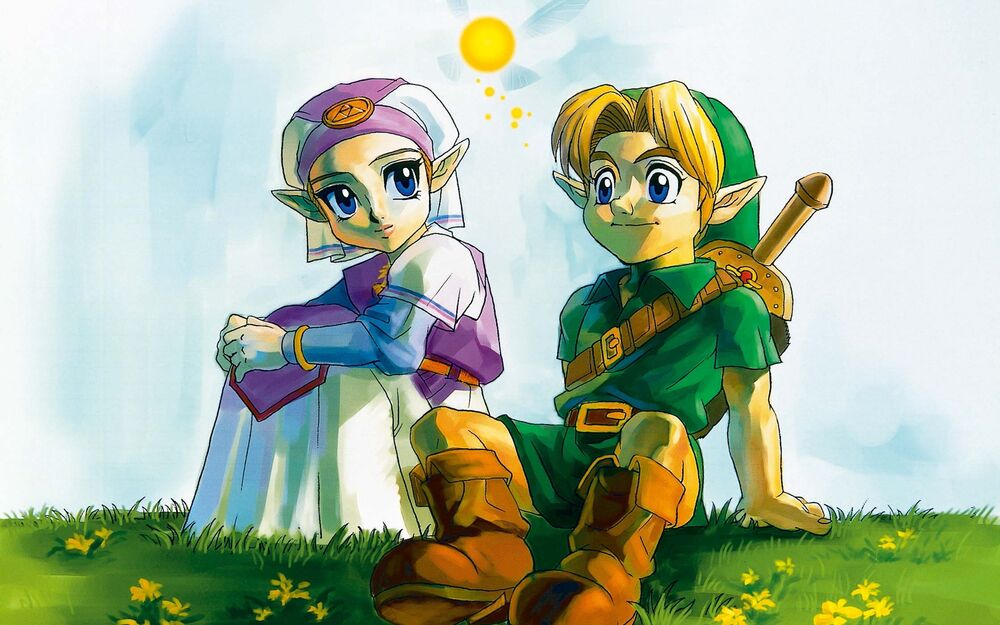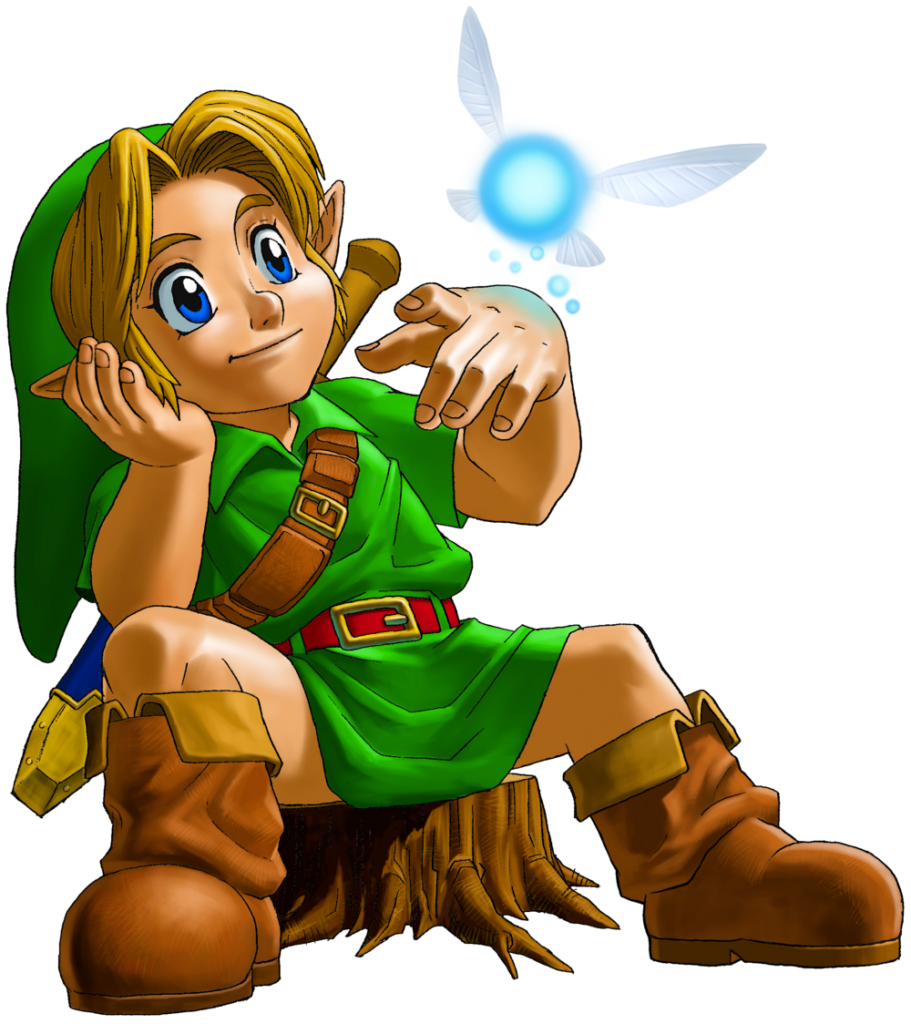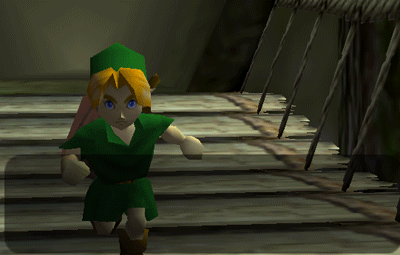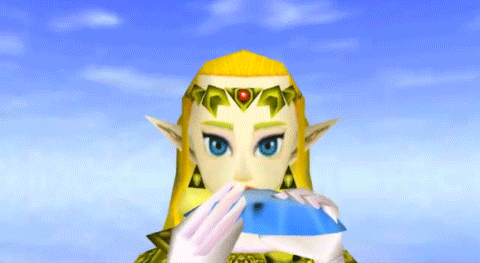

Features
The Legend of Zelda: Ocarina of Time is a Beautiful Tragedy About Growing Up
The Legend of Zelda: Ocarina of Time is a beautiful tragedy that gets to the heart of growing up.
Link is one of Nintendo’s most fascinating protagonists, in that he is one of many. From as early as A Link to the Past, The Legend of Zelda has been home to a multitude of Links. While the first few games made little effort to characterize Link beyond some light backstory, Ocarina of Time presented an opportunity to give him an actual arc. Where the Hero of Hyrule (Hyrule Fantasy, Adventure of Link) and Legendary Hero (A Link to the Past, Link’s Awakening) are almost fairy tale-esque in how their suffering is reversed by the ends of their games, the Hero of Time (Ocarina of Time, Majora’s Mask) carries a cross his entire life. His is a classic coming-of-age story that turns Link into someone beyond a silent avatar. The Legend of Zelda: Ocarina of Time is revolutionary for a myriad of reasons, but it doesn’t get enough credit for how profound its storytelling is.
“The flow of time is always cruel… Its speed seems different for each person, but no one can change it…”
Ocarina of Time is, at its core, a tragedy. The worst thing that happens to the Hero of Hyrule is that he becomes the target of Ganon’s cultists. By the end of Adventure of Link, he has proven himself worthy of the Triforce of Courage and successfully fought back Ganon’s forces. The worst thing that happens to the Legendary Hero is his uncle’s death. By the end of A Link to the Past, everyone who died during Ganon’s conquest has been revived and Link is free to gleefully explore the world at his leisure. The worst thing that happens to the Hero of Time is hard to pin down considering just how much the boy suffers in OoT alone.

This Link is a war-orphan and a refugee, left in the care of the Great Deku Tree by a dying mother her son never meets. Life in Kokiri Forest is safe but isolating, as the children of the forest never quite see Link as one of their own. Dialogue heavily suggests Link was othered by his peers. Link’s treehouse is isolated from the rest of his community, tucked away on a lower level of the forest and fenced off. Saria notes that Link is a “true Kokiri” now that he has Navi, showing that even his closest friend saw an inherent difference between them. The Deku Tree refers to him as “the boy without a fairy,” an authority figure immediately othering the Hero of Time within the context of the story. Link’s life is lonely and lacking in solidarity. Compare this to the sense of family each other Link either has or eventually finds.
The Hero of Hyrule has no mentioned family, but he wins over the affection of two Princess Zeldas. The Legendary Hero was trained by and lives with his uncle. The Hero of Winds (The Wind Waker, Phantom Hourglass) has a grandmother and younger sister who care about him deeply. The Little Hero (The Minish Cap) and New Hero of Hyrule (A Link Between Worlds, Tri Force Heroes) both live with their grandfathers. The Divine Beast (Twilight Princess) and Hylia’s Chosen Hero (Skyward Sword) both come from tight-knit communities that go out of their way to take care of them. The Royal Engineer (Spirit Tracks) and Hero of the Wild (Breath of the Wild) are members of prestige brotherhoods and forge deeply intimate bonds with their respective Princesses.
At most, the Hero of Time had Saria and the Great Deku Tree before Navi. And while Mido does refer to Link as their “favorite,” the Kokiri hardly share the same sentiment. No one seems particularly choked up to see Link leave the forest and Mido & Fado are actively stand-offish, almost accusing him of being responsible for the Deku Tree’s death. “What did you do!? The Great Deku Tree… did he… die? How could you do a thing like that!?” / “What did you do to the Great Deku Tree?” The only person who bothers seeing Link off is Saria, yet all he can do is run away from the moment. He lacks the emotional maturity to say goodbye properly.

It makes for an interesting parallel when Link calmly walks off after being abandoned by Navi in the ending, signifying his newfound maturity. It’s also a beat that bookends the Hero of Time’s story with sadness. His journey begins and ends by bidding farewell to his closest companions, presumably never seeing either one again. The only thing Link has to show for his adventure is the growth he internally underwent. It almost takes some of the whimsy out of Ocarina of Time to scrutinize over Link’s arc so intently, but the game gains something a bit more profound in return: pathos.
It’s hard not to feel for the Hero of Time, or his Zelda for that matter. Part of what makes Ocarina of Time a quintessential coming-of-age narrative is that it does not shy away from childish mistakes or the inevitable failures we all experience as we transition into adulthood. Tragic heroes all have a flaw, and Link and Zelda are undone by their youth. They are forced to grow up before their time (literally in Link’s case), making the mistakes young people would realistically make in their situation. Zelda’s master plan to get the Triforce before Ganondorf can is unraveled by the short-sightedness only a child could have.
She does not have the life experience to consider that the Triforce is already in the safest place it could be — locked away in a Sacred Realm. Ganondorf has also failed to collect the three Spiritual Stones, whereas Link already has one by the time he meets Zelda. By sending Link off to collect the remaining Stones and take the Triforce for themselves, the only thing Zelda accomplishes is Ganondorf’s hard work for him. The Master Sword deems young Link unworthy of wielding it and throws him into a seven year coma, as if divine punishment for his recklessness. Zelda herself goes into hiding and assumes a new identity just to survive, left to watch from afar as Hyrule is desecrated by a tyrant she gave the keys to the kingdom to.

“A childish mind will turn to noble ambition… Young love will become deep affection… The clear water’s surface reflects growth…”
Finding yourself is a natural part of growing up, so it makes sense that identity plays a key role in both Link and Zelda’s arcs. Link does not know who he is, Zelda has to hide who she truly is. Now the deposed princess of Ganondorf’s kingdom, Zelda poses as a Sheikah named Sheik. She waits seven years for Link to reappear just to help him from a distance, keeping the only person who can possibly understand what she’s been through at arm’s length. She is a survivor who will do anything to heal Hyrule, no matter the pain it may bring her. Zelda cannot afford to be herself. Yet it’s in being Sheik where she displays the qualities Hyrule’s leader needs: the patience to simply wait, the courage to fight alongside her people, and the wisdom to right her wrongs.
Zelda has her kingdom ripped away from her, but Link is in many respects a man without a nation. He is raised as a Kokiri his entire life, but ostracized enough where he has no real attachment to the culture. He doesn’t even live in Kokiri Forest after returning home. Link finding out he is a Hylian does not so much as shake him, because his identity was never tied to culture — it was tied to being alone. He went from being the boy without a fairy to the Hero of Time, something no other Hylian can understand.
Link and Zelda’s final parting highlights just how much the two have been through. Zelda’s face conveys a genuine amount of sadness bordering on regret. Link has to go home. He deserves a second chance at his childhood for everything he’s gone through. “Now, go home, Link! Regain your lost time! Home… Where you are supposed to be… the way you are supposed to be.” But doing so means that Zelda no longer has anyone by her side who comprehends what she’s been through, a fate she unknowingly condemns Link to as Navi leaves him seconds after they get back. Link and Zelda are kindred spirits divided by time.

What makes Ocarina of Time’s story so profound is that its fantastical narrative is grounded in real emotion. People come and go. Our closest companions leave, sometimes without so much as a warning. We might discover who we always were only to realize it doesn’t matter in the face of who we are. Others might decide on our behalf that it’s best to say goodbye, leaving us to pick up the pieces alone. Growing up means spending day after day with a friend just so they can suddenly go their own way. The Hero of Time’s arc is a classic hero’s journey steeped in a profoundly human sadness. Growing up before our time, letting go of childhood before we’ve even had the chance to grasp it, and losing familiarity’s comfort as it’s ravaged by time. It’s precisely this level of tragedy that emotionally grounds Ocarina.
There’s a layer of depth present in OoT’s writing that reveals itself when you look beyond the surface. The Hero of Time’s backstory is still one of the most comprehensive in the series, with most Links never getting the same amount of attention given to their identity. Who he was is shrouded in mystery, but you can cohesively track this Link’s life from childhood into adulthood. Not even the heroes with sequels grow quite like the Hero of Time. We see him become a man and leave his boyish traits behind. Princess Zelda has actual agency and gets to be an active member of the plot as Sheik. Zelda is as much a main character as Link, their stories naturally intersecting and reflecting one another. Heroism often comes without glory or reward. You will not necessarily be praised or even acknowledged for your accomplishments. No one might even notice. But that doesn’t mean the right thing isn’t worth doing.
No other Link before or after has undergone as tragic an arc. Zeldas who stand by their heroes as legitimate co-leads are still a rarity for the series. Which is a shame, because it’s really what elevates Ocarina of Time as a story. Link has zero dialogue, but you can still relate to what is happening to him and trace a clear arc from the start of the game to the very end. Zelda has a tangible presence throughout the whole story and helps Link beat Ganon. Sheik’s flowery speech injects the script with a poetic language that incites self-reflection. “Time passes, people move… Like a river’s flow, it never ends…” The Hero and Princess of Time are the stars of The Legend of Zelda’s greatest tragedy.

“Link, you have fully matured as an adult. From now on, the future of all the people in Hyrule is on your shoulders.”
Tragic figures are compelling. They fail, but can offer us the hope that we can overcome our own failings. Link’s reckless need to dive headfirst into any conflict becomes genuine courage as he braves Hyrule’s Temples. Zelda learns from her mistakes, wisely guiding Link from a distance and gaining an emotional intelligence that sells her growth from a rash princess playing hero to a worthy queen. “All the tragedy that has befallen Hyrule was my doing… I was so young… I could not comprehend the consequences of trying to control the Sacred Realm. I dragged you into it, too.”

Time is a double-edged sword. Everything we gain from time, we lose something in return. Wisdom comes at the cost of innocence and perception of blissful ignorance. Maturity is forged through failure, each chain its own symbol of pain. Link ends Ocarina of Time lonelier than he began, Navi gone and the friendships he made non-existent. If Majora’s Mask were a lesser sequel, it would have ended with Link and Navi reuniting, but it doesn’t, because that’s not true to life or Ocarina’s point. What separates Ocarina of Time from virtually every other Zelda game is that fantasy concedes to reality. The hero pulls the sword out of the stone, but not without damning consequences. The hero saves the world, but not without paying a personal price. The hero comes home, but nothing and no one is the same.
The Legend of Zelda is no stranger to bittersweet endings, with Link’s Awakening beating Ocarina of Time to the punch by half a decade, but melancholia is ingrained in OoT’s DNA on an intimate level. Link and Zelda eventually succeed at stopping Ganon, but not without being irrevocably changed. The boy who lived a lonely life gave his childhood away to save a world he cannot take part in. The princess who had enough foresight to prevent calamity inadvertently brings ruin upon her kingdom and bids farewell to her only knight — only friend — as penance.

Sending Link back in time is a kind gesture, but it’s not the mercy Zelda thinks it is. Ignoring all narrative speculation, the reason Navi leaves at the end of the game is simple. Even if you could go back in time and somehow relive your childhood, you wouldn’t be the same. We can never truly go back to who we were, even when a fantasy princess bends the rules of space and time to will it so. Navi’s departure puts Link back where he started, but with the emotional maturity to walk into the future instead of running in fear. It’s a powerful note to end Link’s arc on, a reflection of the childhood he will never get back and the courage that helps us confront the future.
Childhood may fly by, but the memories we make last a lifetime. Adulthood is not without its suffering, but it can make us stronger. Tragedy shapes and breaks and reshapes everything, but that doesn’t mean you won’t find happiness in the moments in-between. Ocarina of Time’s story is not joyless, but it does take itself seriously and respects the audience’s emotions enough to make Link and Zelda earn their victory — their growth. They need to grow up and find themselves before taking on their responsibilities in earnest, which in a way is the journey we all have to go on through life. Relatably human, The Legend of Zelda: Ocarina of Time is a beautiful tragedy that gets to the heart of growing up.

-

 Features3 weeks ago
Features3 weeks agoDon’t Watch These 5 Fantasy Anime… Unless You Want to Be Obsessed
-

 Features3 weeks ago
Features3 weeks ago“Even if it’s used a little, it’s fine”: Demon Slayer Star Shrugs Off AI Threat
-

 Culture3 weeks ago
Culture3 weeks agoMultiplayer Online Gaming Communities Connect Players Across International Borders
-

 Features1 week ago
Features1 week agoBest Cross-Platform Games for PC, PS5, Xbox, and Switch
-

 Game Reviews3 weeks ago
Game Reviews3 weeks agoHow Overcooked! 2 Made Ruining Friendships Fun
-

 Guides4 weeks ago
Guides4 weeks agoMaking Gold in WoW: Smart, Steady, and Enjoyable
-

 Game Reviews3 weeks ago
Game Reviews3 weeks agoHow Persona 5 Royal Critiques the Cult of Success
-

 Features2 weeks ago
Features2 weeks ago8 Video Games That Gradually Get Harder
-

 Features2 weeks ago
Features2 weeks agoDon’t Miss This: Tokyo Revengers’ ‘Three Titans’ Arc Is What Fans Have Waited For!
-

 Features1 week ago
Features1 week agoThe End Is Near! Demon Slayer’s Final Arc Trailer Hints at a Battle of Legends
-

 Guides2 weeks ago
Guides2 weeks agoHow to buy games on Steam without a credit card
-

 Uncategorized2 weeks ago
Uncategorized2 weeks agoSleep Meditation Music: The Key to Unwinding




















Alex
February 22, 2022 at 4:51 pm
That was an astute realization that Link got put into a 7 year coma for his recklessness.
Daniel W
February 22, 2022 at 8:42 pm
OoT is such a deep game. I think there is something to the Sages as well, he makes friends along the way, only to loose them in the end. Love the angle you take on the story! There is so much that it can be hard to cover it all.
Mark
February 23, 2022 at 2:01 am
This was a absolutely delightful read and I’m grateful for you taking the time to post it. Thank you.
JJ
February 23, 2022 at 3:51 pm
This was a beautifully written article. Thank you for writing it, it conveys just how sad Ocarina of Time truly is, but highlights the important lessons that we can take away from it.
Kilwede
February 23, 2022 at 7:13 pm
Well done on the article bud. This is the reason I love video games, when we can experience a profound story through our own actions. It’s something movies and books have no way of replicating since iys perfectly aligned to have the player themselves experience it.
Josh
February 24, 2022 at 10:13 am
It’s funny that it takes growing up to truly resonate with this story. Understood the writing but never took in what everything meant in the grand scheme. You really brought it to life.